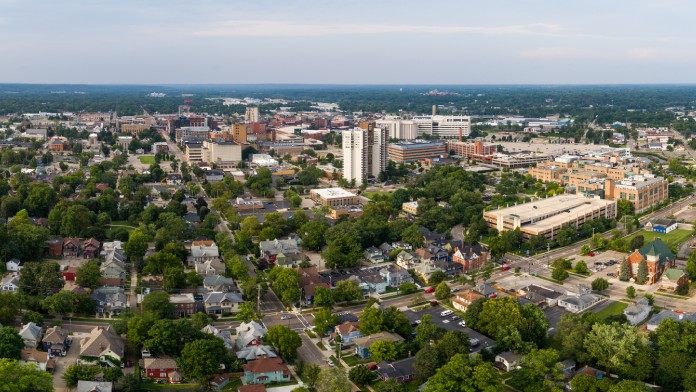Alcohol and Drug Use Statistics in Kalamazoo, MI
Kalamazoo has seen a dramatic rise in drug use and related deaths in recent years. Data compiled by the Kalamazoo County Government and the State of Michigan shows that:1, 3, 4, 5
Roughly 70% of overdose victims are male, roughly 50% are Black, and approximately 24% are white.
The 35 to 44 age bracket consistently has the highest drug-related overdose fatality rate.
Levels of Substance Abuse Care
There are several levels of care for addiction treatment. Some people enter treatment at one level, while others start with inpatient and make their way through the continuum of care.
Alcohol and Drug Detoxification
Detox is the process of safely and comfortably removing drugs or alcohol from your system. Performed under medical supervision in a hospital, residential, or outpatient setting, your withdrawal symptoms are comfortably managed, allowing you to transition into formal treatment services.
Inpatient Drug and Alcohol Rehab
Residential or inpatient treatment involves living at the rehab facility and receiving 24/7 care under supervision. A combination of treatment interventions are offered, including individual and group therapy, nutritional counseling, experiential therapies, and medication.
Partial Hospitalization Programs (PHPs)
PHPs allow you to live at home while attending treatment at a hospital. You may receive many of the same treatment modalities as within patient care, with the difference being that you can return home during non-treatment hours. PHPs can be a bridge between inpatient and outpatient care.
Intensive Outpatient Programs (IOPs)
A step down from a PHP, IOPs allow you to attend a few hours of counseling over several days each week. You spend the rest of your time at home, working, or fulfilling other obligations.
Standard Outpatient
The least intensive treatment option, standard outpatient care involves one to two hours of treatment per week. This option has the least oversight and supervision. Highly motivated people with a strong support system tend to find this level beneficial.
Relapse Prevention
Relapse prevention, also known as aftercare, begins when a rehab program is complete. People receive forms of ongoing support and encouragement through 12-step groups, non-12-step groups like SMART Recovery, ongoing therapy, sober living homes, and more.
How to Pay for Substance Addiction Treatment in Kalamazoo, Michigan
Private Insurance
By law, all insurance providers are required to cover substance abuse and mental health treatment services in some capacity. Call your provider to learn about your specific coverage, including your deductible and copay.
Michigan Medicaid
Michigan’s Medicaid program provides health insurance to low-income residents. It covers various treatment services like inpatient drug rehab and outpatient substance abuse treatment. Make sure to ask if the treatment center you’re interested in accepts Medicaid.
Michigan Medicare
Michigan Medicare is a government program providing coverage to residents with end-stage renal disease and those over the age of 65. You can use Medicare to cover the cost of drug addiction treatment services, including rehab.3 Some rehabs don’t accept Medicare insurance, so it’s important to do your research.
TRICARE in Michigan
Michigan TRICARE is a government program providing health insurance coverage to the U.S. Armed Forces military personnel, veterans, and their families and dependents. TRICARE covers addiction treatment services, such as rehab and medication-assisted treatment.
Sliding Scale Rehabs
Sliding scale rehabs are income-based, charging only what a resident can reasonably afford to pay. In order to qualify for a sliding scale rehab in Michigan, be prepared to provide proof of income.
IHS-Funded Drug Rehabs
Drug rehabs funded by the Indian Health Service provide free addiction treatment to Indigenous people in the U.S. and Alaskan Natives.
Traveling to and Within Kalamazoo, MI
 Are you hoping to visit someone who’s working through treatment in a Kalamazoo drug rehab center? Are you considering traveling from where you currently live to a drug or alcohol rehab in Kalamazoo? If you haven’t been to the city, here’s what you should know to plan your trip:
Are you hoping to visit someone who’s working through treatment in a Kalamazoo drug rehab center? Are you considering traveling from where you currently live to a drug or alcohol rehab in Kalamazoo? If you haven’t been to the city, here’s what you should know to plan your trip:
- The closest airport is Kalamazoo/Battle Creek International Airport, which is located in Portage, roughly 20 minutes south of the city. The larger Gerald R. Ford International Airport is 50 miles north of the city in Grand Rapids.
- Interstate 94 passes through Kalamazoo and connects the city to Ann Arbor and Detroit to the east and Chicago to the west.
- You’ll find about a dozen national-chain hotels and motels in Kalamazoo, most of which are quite affordable.
- If you need public transportation, Kalamazoo Metro Transit operates several fixed bus routes, most of which operate seven days a week.
- Various on-demand ridesharing services are available in Kalamazoo, including Uber and Lyft. Taxi service is also available.
- Downtown Kalamazoo has several locally-owned shops, eateries, public parks, and cafes. It also has a couple of performance theaters and concert halls.
- Kalamazoo Bird Sanctuary, Binder Park Zoo, Fort Custer National Cemetery, and Celery Flats Historical Area offer outdoor entertainment to suit a variety of tastes.
- If you’re an art lover or history buff, don’t miss the city’s Underground Railroad House, the Gilmore Car Museum, and the Air Zoo Aerospace & Science Museum.
Michigan Alcohol and Drug Laws
Michigan lawmakers and public health agencies enacted the following laws related to substance misuse and overdoses:1
Michigan Good Samaritan Overdose Law: This law encourages witnesses to call 911 when someone is experiencing an overdose and protects them from prosecution for minor drug-related charges.
Michigan Naloxone Access Law: Pharmacists in Michigan can dispense Narcan (naloxone) without a prescription, increasing access to this life-saving opioid overdose reversal medication.
Michigan Driving or Operating Under the Influence Laws: A first offense of driving or operating under the influence of alcohol or liquor (OUIL) or drugs (OUID) results in a fine up to $500, imprisonment up to 93 days, and/or driver’s license suspension for up to two years.4 Additional offenses can lead to imprisonment of up to five years and driver’s license revocation for up to five years.
Michigan Regulation and Taxation of Marijuana Act: In 2018, the Michigan Regulation and Taxation of Marijuana Act legalized recreational marijuana for adults over the age of 21. Michigan state law specifies all use of cannabis must be done in private; it is illegal to use cannabis in a public space. It is also illegal to carry cannabis in areas frequented by children, such as schools or school buses.
Resources
- Centers for Disease Control and Prevention, National Center for Health Statistics. CDC Wonder Online Database. (2021). Underlying Cause of Death, 1999-2020 Results, Deaths occurring through 2020.
- Substance Abuse and Mental Health Services Administration. (n.d.). FindTreatment.gov.
- Kalamazoo County Government. (2019, March 4). Kalamazoo County DRug and opioid Epidemic Brief & Report Released.
- State of Michigan. (n.d.). Michigan Overdose Data to Action Dashboard.
- Western Michigan University Homer Stryker M.D. School of Medicine. (2019). Trends in Opioid-Related Deaths In Kalamazoo County, Michigan.



